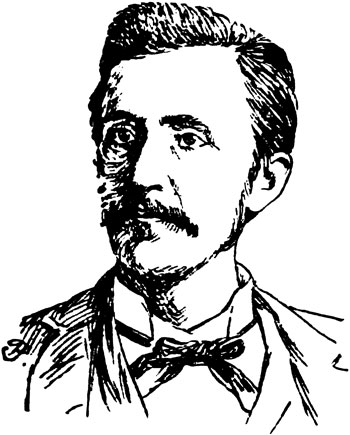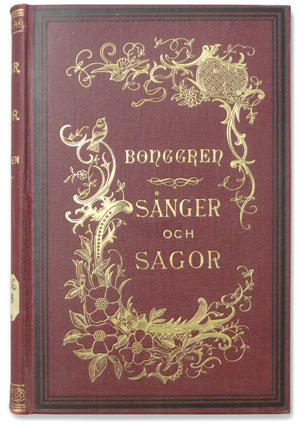The Poet
Jakob & Johanna Bonggren purchased the house at 3101 W. Lyndale in August 1886. The couple were originally from the small city of Mora in Dalarna, Sweden. Jakob had been postmaster in Mora, while writing poetry and newspaper articles in his spare time. After publishing a book of poems critical of the conservatism and inequality of Swedish society, he decided to leave the country. With a job offer to become a correspondent for the Svenska Amerikanaren newspaper in Chicago, he and Johanna and their three children first came to Moline, Illinois in 1882. They moved to Chicago the following year.

Portrait of Jakob Bonggren from Dec 17, 1893 Chicago Tribune
There were as many as 1,500 small newspapers and magazines published in Chicago in the nineteenth century, in every language of its citizens. The weekly Svenska Amerikanaren was first published in 1877 as a liberal and radical counterpoint to the Lutheran-affiliated Hemlandet (The Homeland). By the time Bonggren started writing for the paper it had changed ownership and toned down its politics, but was still strongly associated with Republicanism and secular views.
Jakob Bonggren was a prolific writer for the Svenska Amerikanaren. He wrote opinion columns, book reviews, and a weekly poem which was published on the front page. In 1888 he became editor of the newspaper and served for twenty years.
Professor Anna Williams writes that Bonggren's poetry and views changed after his arrival in America. Leaving behind the radical criticism of his youth, he later looked back on his homeland with an emigrant's nostalgia. His writing shifted from the social-realism style such as his contemporary August Strindberg to an idealization of the traditions of his heritage, perhaps in opposition to the empty capitalism he saw in America.
During the time Bonggren lived on Lyndale he became a well-known intellectual in the Swedish-American community. He was invited to speak at public events, banquets and festivals, where he often read a short poem or dedication composed for the occasion. His translation into Swedish of Ignatius Donnelly's dystopian novel Caesar's Column was well received in the Swedish literary world. He was also becoming known as a speaker on Theosophy. As president of the local Scandinavian Theosophical chapter, Bonggren gave monthly lectures on esoteric topics such as alchemy and King Solomon's Temple.

Sunday morning lecture by Jakob Bonggren at the Masonic Temple building, Dec 26, 1897, Chicago Inter-Ocean
One wonders what Bonggren's working-class neighbors on Lyndale Street thought of the famous free-thinking poet. Did he and the tailor August Lindquist who lived next door chat about the weather over the fence? Bonggren attended services now and then at the nearby Saron Lutheran Church, and even wrote a poem for the 20th anniversary of the church in 1898, but he was not a member of the congregation and perhaps would not have been fully accepted due to his heretical religious views.
Some of the poems that Bonggren wrote for the Svenska Amerikanaren were collected in a 1902 volume entitled Sånger och Sagor (Songs and Stories). The subject matter varies from odes to literary and popular figures, romantic journeys in the ancient past and admirations of nature. When Jakob Bonggren first moved to Lyndale street in 1886, he could have easily walked out to the prairie just a few blocks west to find inspiration in nature, but urban development soon smothered these remnants.

Though none of the poems in the book specifically reference Lyndale Street, the following verse may evoke a feeling of walking down the street on a windy day (please forgive my poor translation):
I staden För prärieland Ej ängar – blott grus! Min konstlösa sång Af husgaflars mängd Så trist och så grått Du vänliga vind, (1899) |
In the city On the prairieland No meadows – just gravel! My artless song The crowded house gables So sad and so gray You kind wind, (1899) |
The Bonggrens lived in the house at 3101 W. Lyndale until the 1910s. Johanna passed away here in 1903 at age 53. Two years later Jakob married 37 year-old Olga Lundin, who sadly died the following year, just a few weeks after giving birth to a baby daughter. After this Olga's older sister Eva came to live with the family to help care for the children.
In the last years of his life, Jakob moved to Oakland, California with his grown children. He was knighted by Swedish King Gustav in 1933 and passed away at age 85 in 1940.
